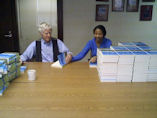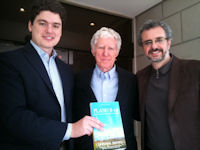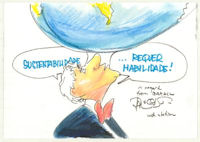Thursday, January 07, 2010
One of the unique qualities of the Earth Policy Institute is its interdisciplinary and global vision that often allows it to see trends that more specialized organizations cannot. Such research generates attention.
Lester Brown, EPI’s president and senior researcher, has a long history of seeing trends before others. When but a comparative youngster at the U.S. Department of Agriculture in the 1960s, he predicted an impending famine in India. The USDA team following India’s food production was skeptical. Orville Freeman, then Secretary of Agriculture, accepted Lester’s analysis and mounted the largest food relief effort in history, averting what would have been a great famine.
Sometimes Lester has been quite far ahead on his predictions. His book World Without Borders published in 1972 was the first to discuss the various implications of globalization—before the term was even in the lexicon.
He pioneered a redefinition of national security in his 1977 paper entitled “Redefining National Security” where he discussed that a military threat to national security was only one of many that governments should be addressing. The new threats were coming from stresses on the earth’s natural systems and resources.
Other groundbreaking work came through his book Who Will Feed China? (1995). That China is now leasing land in other countries to grow food for its people indicates the sharpness of his vision. (For more information on this phenomenon, see Chapter 1 in Plan B 4.0: Mobilizing to Save Civilization.)
More recently Lester was ahead of the curve on the food versus fuel issue. His Plan B Update released in 2005, “Ethanol’s Potential: Looking Beyond Corn” was the first of a number of Updates and articles on this issue. Even earlier, he’d seen the problem of relying on ethanol in a paper he wrote in 1980 entitled “Food or Fuel: New Competition for the World’s Cropland.”
This week, Lester weighed in on another trend that is just getting underway. In his Plan B Update, U.S. Car Fleet Shrank by Four Million in 2009 - After a Century of Growth, U.S. Fleet Entering Era of Decline, Lester noted that America’s century-old love affair with the automobile may be coming to an end. The reasons include market saturation (nearly five vehicles for every four drivers), the number of cars scrapped in 2009 exceeding by 4 million the number of new cars sold, “ongoing urbanization, economic uncertainty, oil insecurity, the prospect of higher gasoline prices, the rising costs of traffic congestion, mounting concerns about climate change, and the declining interest in cars among young people who have grown up in cities.”
The media pickup on this release has been greater than anticipated. While we like to post select stories about our work in our EPI in the News page, we’re unable to post all the coverage there. To give you a sense of the breadth, the analysis has been covered by Reuters, Chicago Tribune, Environmental News Network, Epoch Times, Globe and Mail, Greenwire, Guardian, Los Angeles Times, New York Times, Scientific American, Slate, Telegraph, US News and World Report, Washington Post, dozens of blogs and radio stations including the Environment Report and NPR, and a number of television stations, including ABC News, CNBC’s Street Signs, and MSNBC. The number of international newspapers running the story is increasing rapidly.
News coverage indicates interest, while time will verify Lester’s analysis. (By the way, don’t overlook the wealth of data backing up the Update. Several articles have featured these data, along with the graphs the EPI team created.)
In the meantime, we at EPI will continue to look at global trends and present our findings to you through our publications. So stay tuned!
Sincerely,
Reah Janise Kauffman
Vice President
Wednesday, December 23, 2009
This has been a busy year.
Our research staff worked heroically during the first part of this year to produce a new edition of Plan B—Plan B 4.0: Mobilizing to Save Civilization by Lester Brown, which was released on September 29. If you haven’t yet had a chance to see the book yet, check out chapters 1 and 5, “Selling Our Future” and “Stabilizing Climate: Shifting to Renewable Energy.” You can also listen to radio interviews about the book and also watch lectures by Lester.
In March the team released a Plan B 3.0 presentation (PowerPoint and PDF) that has been downloaded over 10,000 times and translated into French and Spanish. An updated version using the new data in Plan B 4.0 was released in early November.
One of the more satisfying things this year has been seeing our early work calling for an 80 percent cut in carbon emissions by 2020 gaining traction with other organizations and some national governments. 
The May issue of Scientific American featured an article by Lester entitled “Could Food Shortages Bring Down Civilization?” where he revealed that the biggest threat to global political stability is the potential for food crises in poor countries to cause government collapse. Food shortages could be the weak link that brings down civilization.
COP15: Janet Larsen, our Director of Research, was a speaker at an NGO-sponsored event at the UN Conference on Climate Change as well as an observer. She wrote several articles for National Journal’s COP15 blog that we also posted on our blog. Lester weighed in early with a number of articles, including two features in the Washington Post and one in the Guardian.
Meanwhile, Lester launched the Portuguese edition in of Plan B 4.0 in São Paulo and the English edition in London. He also went on a two week book tour in the United States. (See our Events page.) Other translations are in the works and Lester will be launching a number of them next year. Our EPI in the News section gives you access to webcasts of some of the lectures, radio interviews, and more.
This year we totally revamped our website. One big change is our Data Center that allows for easy access to this wealth of information. Our publications are all available for free downloading, including our books. We’ve even included all of the data behind the numbers in Plan B 4.0. You can receive our podcasts and releases via RSS, and follow us on Twitter and Facebook. EPI’s success to date is due not only to the quality of its research but also because we provide an overall plan of what can be done. In addition, our uniquely global vision often allows us to see trends that more specialized organizations cannot. In short, our research generates attention.
EPI’s success to date is due not only to the quality of its research but also because we provide an overall plan of what can be done. In addition, our uniquely global vision often allows us to see trends that more specialized organizations cannot. In short, our research generates attention.
The Institute recognizes that it will take an enormous dissemination effort to guide the global transition to a Plan B economy. The stakes in the battle to save the planet are high. Saving civilization is not a spectator sport.
Our thanks to all of you for helping in this global effort. As a small organization of eight people, we count on you to help make Plan B a reality. Let’s make 2010 the year we get Plan B on everyone’s agenda.
Sincerely,
Reah Janise Kauffman
Vice President
P.S. If you’ve appreciated receiving our releases and news, searching for data, watching the videos of Lester Brown or listening to our podcasts, please consider a tax-deductible donation. Your support is essential.
Monday, December 14, 2009
Janet Larsen, our Director of Research, has been at the UN Climate Change Conference in Copenhagen this week. During this time, she's posted articles on the National Journal's special COP15 website. Here is her final blog.
Should Young People Trust Political Leaders to Lead? UNFCCC Executive Secretary Says Maybe Not Yet
by Janet Larsen
Today at a packed COP15 side event for intergenerational exchange, a young woman from Mumbai, India, shared her story of living through devastating floods in a country where people have become used to having their homes washed away with increasing regularity. In concluding her speech, Ruchi Jain, India coordinator for the group 350.org, expressed trust in leaders to help combat climate change on behalf of future generations. In response, Executive Secretary of the UN Framework Convention on Climate Change Yvo de Boer cautioned that trust is something that has to be earned, telling her that the negotiations here had yet to earn his trust.
There are some 1,500 youth here at the Copenhagen Conference, and many more attending unofficial events and rallies around the city, and they are trying to make their voices heard. Today many of the young people (and friends, like Middlebury scholar Bill McKibben, whom I just spotted in the hall) are here sporting bright orange shirts with the message "How old will you be in 2050?" At one of the early negotiation sessions, Christina Ora, born in 1992 in the Solomon Islands, implored, "You have been negotiating all our lives; you cannot tell us that you need more time."
Wednesday morning in the main plenary, a youth representative warned the delegates of "carbon colonialism," urging all parties to remain accountable to their past emissions: "It's not enough to say 'Yes we can.' We need to say 'Yes we can, yes we must, and yes we will!'"
That was one of a half-dozen times when enthusiastic applause broke out in yesterday morning's session. An impassioned plea from the Tuvalu delegation for the delegates to "seal the deal" with a legally-binding commitment was the first of the morning to rally the participants here in Copenhagen's Bella Center: "The world is watching us...the time for procrastination is over."
Tuvalu's call for a strong legally-binding agreement was echoed by a number of allies, including many of the other small island states who make up the Alliance of Small Island States (AOSIS). Their message is that limiting the global average temperature rise to 1.5 degrees Celsius is necessary for their very survival. The G-8 has convened on targets of 2 degrees Celsius, the number more broadly discussed here, though existing commitments put us above this trajectory.
As noted in a United Nations Framework Convention on Climate Change (UNFCCC) pre-COP release: "According to the Intergovernmental Panel on Climate Change, an aggregate emission reduction by industrialised countries of between minus 25% and 40% over 1990 levels would be required by 2020 in order to stave off the worst effects of climate change, with global emissions falling by at least 50% by 2050. Even under this scenario, there would be an only a 50% chance of avoiding the most catastrophic consequences." [bolding is mine]
Small island residents, whose societies are at immediate risk from rising seas, and young people, who will be the ones left to face the consequences of warming, have thus far been some of the most passionate voices here. Whether world leaders deserve their trust we have yet to see.
This blog was initially posted on December 10, 2009, on the National Journal UN Climate Change Conference blog.
Also by Janet Larsen from COP15:
What is Necessary to Prevent Dangerous Climate Change?
Economy, Food Drives China’s Renewable Energy Sector
Sunday, December 13, 2009
Janet Larsen, our Director of Research, has been at the UN Climate Change Conference in Copenhagen this week. During this time, she's posted articles on the National Journal's special COP15 website. Here is her second blog.
What is Necessary to Prevent Dangerous Climate Change?
by Janet Larsen
When politicians look at the need to address climate change, they often ask the question: What is politically feasible? Yesterday at a Copenhagen climate conference side event sponsored by the Bellona Foundation, I raised a different question: What is necessary? What kind of cuts in emissions are needed to stop the most dangerous effects of climate change? And, importantly, how do we achieve them?
While negotiations go on as if the world has another 40 or so years left to solve these problems, nature is telling us that we're already close to departing the relatively narrow range of temperatures in which human civilization developed. We are already outpacing the worst-case scenarios for temperature and ice melting that were laid out by the Intergovernmental Panel on Climate Change just two years ago. Can we really afford for the temperature to rise much higher?
Scientists are now talking about the possibility of an ice-free Arctic in the summertime within the next five years (just a few years ago, they were predicting an ice-free summer in the Arctic by 2050). While white ice reflects sunlight, dark open water readily absorbs heat, warming the region. And Greenland, which contains enough ice to raise sea levels by 7 meters (23 feet), is in that very region. Even a fraction of that sea level rise would flood not only small low-lying island nations, who have banded together to deliver their desperate plea to the climate delegates, but also much of Manhattan and London, not to mention Washington's National Mall.
Here in Copenhagen some artists are trying to drive the point home with their Seven Meters exhibit that stretches strings of blinking red LED lights at the seven meter mark around the negotiations center and throughout the city. According to the artists' website, a seven-meter rise in sea level would flood "all of the isle of Amager and big parts of Copenhagen...but already at 2 meters, as some scientists foresee can be a reality in this century, 2/3 of Amager and many areas by the coast and canals will be flooded."
Since business as usual, what we term "Plan A", isn't working, we need a Plan B. Earth Policy Institute has developed a plan for the world to cut net carbon dioxide emissions 80 percent from 2006 levels by 2020. This could prevent atmospheric concentrations of carbon dioxide, now at 387 parts per million (ppm), from exceeding 400 ppm. This sets the stage for making reductions to bring us back down to 350 ppm, the level that a growing number of scientists, like NASA's James Hansen and IPCC head Rajendra Pachauri, have stated is needed. The steps to reach 80 percent reductions by 2020 are laid out in detail here, but in general they involve:
1 - dramatically increasing energy efficiency (changing to more-efficient lighting alone would allow us to close more than 700 of the world's 2,600-some coal fired power plants);
2 - ramping up development of renewable energy (sending coal, now the source of 40 percent of the world's power generation, out the door, and replacing it with clean, widely-distributed, and abundant wind);
3 - ending net deforestation and implementing a major tree-planting and soil-stabilization campaign worldwide.
Are the Plan B goals ambitious? Certainly. Cutting net carbon emissions 80 percent by 2020 will require a dramatic restructuring of the world's economies, with speed and urgency comparable to the entry of the United States into World War II.
The first item on the wish list would be raising the price of carbon to more closely reflect its true cost. Tax shifting, offsetting a price on carbon emissions with a reduction in income taxes, could be an economically efficient way to raise carbon's price in a predictable fashion with incentives for improving energy efficiency.
Is a strong 2020 goal reachable? Only if we get moving soon. The challenge in Copenhagen is to align the politics with what the science tells us is necessary.
This blog was initially posted on December 9, 2009, on the National Journal UN Climate Change Conference blog.
Also by Janet Larsen from COP15:
Economy, Food Drives China’s Renewable Energy Sector
Should Young People Trust Political Leaders to Lead?
Friday, December 11, 2009
Janet Larsen, our Director of Research, has been at the UN Climate Change Conference in Copenhagen this week. During this time, she's posted articles on the National Journal's special COP15 website. Here is her first blog.
Economy, Food Drives China's Energy Sector
by Janet Larsen
In the last several years since China surpassed the United States to become the world’s number one emitter of carbon dioxide, it has become fashionable to point a finger at China for building a new coal-fired power plant every week. There’s no question that new coal is a problem. But as Congressman Markey notes, China is doing far more to green its economy than most give it credit for. And if the United States does not wake up to that reality and get fully on board the green economy train, it will lose market share, job creation potential, and a ride into the 21st century energy economy.
Rather than focus on China’s official pronouncements, look at what the country is doing. Today many U.S.-made cars are banned for sale in China because they are too inefficient to meet China’s stricter fuel economy standards. Some 27 million Chinese homes have rooftop solar water heaters. China leads the world in production of solar photovoltaics that can convert sunlight directly in electricity. Most of those solar panels are sold internationally. China supplied a quarter of U.S. solar panel imports in 2007; since then the share has likely climbed, representing manufacturing jobs being created in China rather than in the United States.
With the production of electricity from the wind, China is set to blow by the United States within the next year or so. China’s Wind Base program is creating 6 massive complexes of over 10,000 megawatts each, which together would double the early 2008 wind power capacity of the entire world. Chinese officials who have been bullish on wind energy supplying a growing share of China’s power were bolstered by a report by Chinese and U.S. scientists published this year in the journal Science, which revealed that the country’s wind potential was seven times larger than its current total electricity consumption. Chinese manufacturers are gearing up to meet the new demand at home and abroad. Last month’s announcement that a new wind project in Texas, which would be partially financed with U.S. stimulus package funds, planned to import Chinese-made turbines provided a glimpse of how the scenario could play out if the U.S. does not do more to foster its domestic renewable energy industries.
That China has a vested interest in renewable energy for economic reasons is clear. But China also has high stakes in preserving a stable climate for a more fundamental reason: food security. Global warming poses a major threat to China’s food supplies. And food security is an incredibly sensitive issue in China since nearly all high-level government officials are themselves survivors of the 1959-61 famine when 30 million Chinese people starved to death.
Agriculture’s 11,000-year existence has been a time of remarkable climate stability. With higher temperatures, droughts can become more prevalent, crop yields suffer, and glacier-fed rivers could periodically run dry. A report last week from China’s Meteorological Administration noted that higher temperatures would shrink yields of food staples like rice and wheat. Already we are seeing faster melting of the mountain glaciers in the Himalayas and on the Tibetan Plateau that feed Asia’s major rivers during the dry season. The Chinese Academy of Sciences has noted that with future warming two-thirds of China’s glaciers could disappear by mid-century. Earth Policy Institute president Lester Brown warns that because China is the world’s leading producer of both wheat and rice, “the vanishing of mountain glaciers in Asia represents the biggest threat to the world food supply that we have ever seen.”
While this may seem far removed from the concerns in the U.S. Congress, with China now our banker, holding some $800 billion in U.S. Treasury securities, the United States can’t very well withhold food exports. Were China to turn to the world market for substantial grain imports, food prices everywhere would rise, driving hunger up even further.
The economic incentives for leading rather than lagging in renewable energy and efficiency are compelling enough, but food security is the trump card for why no country can ignore the urgency of stabilizing climate.
This blog was initially posted on December 7, 2009, on the National Journal UN Climate Change Conference blog.
Thursday, December 03, 2009
Since Lester Brown returned from his two-week book tour promoting Plan B 4.0, we've received such great comments from so many people that we wanted to share a few of them. Lester discussed climate change, food security, population, Plan B, and the progress being made on the renewable energy front.
San Francisco
“Thank you for sharing your insights with our community.” –Greg Dalton, The Commonwealth Club of California
“It is always a pleasure to have you address our members and guests.” –Ned Hawkins, World Affairs Council of Northern California
Portland
“…a well-deserved standing ovation.” –Edward Wolf
“We’d love to have you out this way again.” –Peter Schoonmaker, Illahee
"... awesome. ... While any speech from Lester is bound to be inspiring and relevant, one thing about today's talk that was particularly important is the new information about adoption of renewable power in places like Texas, China, and N. Africa." –Scott Lewis, BrightWorks
Seattle
“Your talk was timely, motivational and inspirational.” –Barbara J. Lither, David Bray, and Melanie Wood, EPA, Region 10
“A ‘wow’ moment for EPA Region 10! Thank you.” –Dave Upulek, EPA, Region 10
“You are a great inspiration.” –Rick Albright, EPA, Region 10
“Thanks for delivering a much needed message in a clear way.” –Don Martin, EPA, Region 10
Minneapolis
“Thank you for your outstanding lecture at the University of Minnesota. … It was truly inspiring.” –Jonathan Foley, Institute on the Environment, University of Minnesota
“…a memorable occasion…” –Diane Ross
Denver
“Our guests, tenants, and staff were delighted to have the chance to share your time and expertise. … You are helping the Alliance fulfill its mission of advancing sustainability through collaboration.” –John Powers, Alliance for Sustainable Colorado
Boulder
"It was a pleasure hearing you speak last night at CU Boulder. You've inspired me to get back to work writing letters to the editor about the crisis humanity is facing." –Teresa Foster, Naropa University
If you are interested, here are links to some of the presentations.
• Watch his presentation at the University of Washington on Pirate TV Seattle.
• Listen to his presentation at the University of Minnesota aired on Minnesota Public Radio.
• Listen to his presentation "Tackling Climate Change & Our Growing Food Insecurity" for the World Affairs Council in San Francisco.
And if you were cruising channels over the Thanksgiving weekend you may have seen Lester on CNN's Book TV, which twice aired the presentation he gave at the University of Chicago.
Cheers,
Reah Janise Kauffman
Vice President
Monday, November 23, 2009
The UN CC Conference (COP15) has the world buzzing. Delegations from 193 countries, at least 65 heads of state and government, along with thousands of others including the media, environmental organizations, and students will be attending.
We will be represented by Janet Larsen, our Director of Research, who will be in Copenhagen to speak at a pre-COP15 activity at an energy, climate, and food security symposium being held at the University of Copenhagen.
Discussing the problem of climate change and providing solutions has been a major focus of Earth Policy Institute from its initial book by Lester Brown, Eco-Economy: Building an Economy for the Earth to his most recent book, Plan B 4.0: Mobilizing to Save Civilization. We look at the world’s major global problems—and provide global solutions.
We have also been weighing in directly on the climate change conference in Copenhagen, most specifically on how climate change will detrimentally affect food production—and thus food security. Lester Brown has written several articles about the relationship between climate change and food security. The most recent, "A Hotter Planet Means Less on Our Plates," appeared on Sunday, November 22, in the Washington Post's'special climate change issue.
In the piece Lester points out that as the UN climate change conference approaches, "we are in a race between political tipping points and natural ones." And he raises questions: "Can we cut carbon emissions fast enough to keep the melting of the Greenland ice sheet from becoming irreversible? Can we close coal-fired power plants in time to save at least the larger glaciers in the Himalayas and on the Tibetan plateau? Can we head off ever more intense crop-withering heat waves before they create chaos in world grain markets?"
In the same section of the Washington Post, our data was used for several graphics on global renewable energy.
Earlier this month, Lester released a Plan B Update and spoke at a press teleconference on how the Copenhagen conference is really about food security, even though that is not the main agenda.
On November 10, The Ecologist ran an interview of Lester entitled "We Shouldn't Count on Copenhagen to Save Us." In reply to a question on what he expected to come out of the Copenhagen negotiations, Lester replied that while he didn't think there would be "anything bold coming out of Copenhagen. I think we should go to Copenhagen with a bold proposal and push really hard."
In his commentary "Time for Action is Upon Us" that ran in a special climate edition of Roll Call on November 9, Lester said, "As Congress continues debating climate change legislation, our leaders are faced with a choice: build on the progress we have made to curb emissions (U.S. carbon emissions dropped 9 percent between 2007 and 2009), grow clean energy companies and stop climate change, or stick our heads in the sand and delusionally hope the problem solves itself." He noted that the transition from fossil fuels to renewable energy sources is already underway in the United States, but the pace is far too slow either to stave off the worst effects of climate change or to ensure that American companies and workers secure the economic benefits of the emerging global clean energy economy.
He noted that we need a far more ambitious goal for cutting carbon emissions. A cut of 80 percent from today's levels by 2020, not 2050, would halt the rise in the atmospheric carbon dioxide concentration at 400 parts per million. We could then work to reduce carbon dioxide levels to 350 parts per million, which James Hansen, a leading U.S. government climate scientist, and Rajendra Pachauri, the head of the Nobel Prize-winning Intergovernmental Panel on Climate Change, are pushing for.
Bill McKibben and his organization 350.org is pursuing this goal as well. They even organized a "planetary day of action" on October 24, 2009 to draw attention to this important goal.
Another commentary by Lester on the U.N. Climate Change Conference was printed in The Guardian on November 3, 2009, entitled "We Only Have Months, Not Years, to Save Civilisation from Climate Change."
Lester's book, Plan B 4.0 provides solutions. Check it out. We have it online for free downloading.
We no longer have the luxury of time. We all need to weigh in on climate change and let our elected representatives know that the United States must take a bold approach.
Cheers,
Reah Janise Kauffman
Vice President
Monday, November 09, 2009
Lester Brown, president of Earth Policy Institute, is off on another book tour, promoting Plan B 4.0: Mobilizing to Save Civilization in San Francisco, Portland, Seattle, Minneapolis, Chicago, Boulder, and Ft. Collins. If you are interested in attending any of the various presentations, details can be found on our Events page.
But what about the last trip, you ask? 
After a successful launching of the Portuguese edition at the Museum of Art in Sao Paulo on Thursday, October 22, Lester spent the next day being interviewed by Brazil’s major newspapers. That evening he was literally the center of attention in a taping of Brazil’s widely watched cultural program, Roda Viva.
 |
 |
Surrounded by reporters and scientists, Lester took questions for over an hour about issues including climate change, renewable energy, food security, water scarcity, and cutting carbon emissions 80 percent by 2020. The program features the artist Paul Caruso who produces caricatures during the discussion.
On October 26, Lester met with President Girma Woldegiorgis, President of Ethiopia, and had an engaging discussion on environmental issues. President Woldegiorgis has promoted tree planting in Ethiopia and is a strong supporter of the environment.
At the International Conference of Parliamentarians on Population and Development in Addis Ababa (over 500 parliamentarians, ministers, and government officials from 115 countries), Lester spoke to a rapt, standing-room-only audience about the interrelationships of water, food scarcity, population, and climate change.
Lester also participated in a press conference of ten leading Ethiopian NGOs including farmers, pastoralists, women, youth, students, children, and environmentalists who called on U.S. President Obama to take a leadership role at the U.N. Conference on Climate Change. They urged President Obama, “to take the lead …through endorsing a strong domestic climate bill that is helpful for the international process” and for the U.S. negotiators at Copenhagen to have “a clear target and pledge.”
In London on October 29, Lester gave Compassion in World Farming's 2009 Peter Roberts Memorial Lecture and launched Plan B 4.0. He told the 400-strong audience: "Like earlier civilizations that got into environmental trouble, we have to make a choice. We can stay with business as usual and watch our economy decline and our civilization unravel, or we can adopt Plan B and be the generation that mobilizes to save civilization. Our generation will make the decision, but it will affect life on earth for all generations to come."
He called on individuals to reduce their meat and dairy consumption to fight climate change: "Although we seldom consider the climate effect of various dietary options, they are substantial, to say the least. … A plant-based diet requires roughly one fourth as much energy as a diet rich in red meat. Shifting from the latter to a plant-based diet cuts greenhouse gas emissions almost as much as shifting from a Suburban to a Prius [car] would. If in the affluent countries, we can move down the food chain, we can save energy, land and water."
EPI’s Director of Research, Janet Larsen, has also been out and about. On Thursday, November 5, she spoke at the University of Central Florida's Climate Change and National/Global Security conference on the role of Plan B in saving civilization from the impacts of climate change.
Cheers,
Reah Janise Kauffman
Vice President
P.S. Follow Lester's book tour on our Events page.
Thursday, October 22, 2009
At this writing Lester Brown is in Sao Paulo, Brazil, launching the Portuguese edition of Plan B 4.0. Our Brazilian publisher Virtu Editora e Productora Ltda. has teamed up with Bradesco Bank to make this translation and outreach possible. Edoardo Rivetti, the head of Virtu Editora picked up a copy of Plan B 3.0 in a bookstore in New York when he and his wife were visiting last year and decided that the book should be made available in Portuguese.
But Plan B is not just a book in Brazil. It is a plan of action. In August, Plan B was the focus of the 2020 Climate Campaign, an initiative of the State of the World Forum, which was held in Belo Horizonte in the state of Minas Gerais. The campaign aims to activate the climate component of Plan B, with the global goal of a rapid reduction in carbon emissions by the year 2020. From the local to the national to the international, governments and other institutions are being encouraged to transcend traditional politics (where action can often be slow and incremental) to listen to what science is saying about climate change and quickly to make the changes that are needed to stabilize climate.
A number of Brazilian government, business, civil society, and media leaders have already embraced the challenge to cut carbon emissions 80 percent by 2020. Brazil could well be a world leader in this effort.
Minas Gerais, the first state in Brazil to complete an accounting of its carbon footprint, was the 2020 Leadership Campaign’s inaugural signatory in early August 2009. It will establish a scientific panel to begin crafting an emissions reductions plan. Other Brazilian states looking to join the campaign include Bahia, Paraná, and Santa Catarina.
Earlier this month, the Amazonian governors committed to reducing deforestation by 80 percent by 2020 and appealed to the international community to assist them in attaining this goal.
Curitiba was Brazil’s first city to sign on and is planning to develop an integrated climate strategy. Rio de Janeiro will likely be next to join the campaign, which is appropriate as Rio will be the site of the 2020 Campaign’s official launch in August 2010.
The slogan for the 2020 Campaign is “To dentro”/“I’m in.” The leaders who are embracing this call recognize that making the necessary adjustments to stabilize climate can bring sustainable wealth. Companies that move quickly in developing renewable energy and energy-efficient industries and buildings will have an economic advantage.
The efforts are being multiplied through the key support of Rede Globo. Globo, one of the world’s largest media networks, has become a climate education pioneer. It is creating and running a series of public service ads to inform people about the escalating dangers of climate change. Globo will also distribute lesson plans and materials to some 7,000 schools across Brazil to educate students about climate and the environment. This is the first time such climate leadership has come from such a major media entity.
We’re not in a crisis because we have no solution, but because we’re not implementing the solutions already at hand. Those solutions are found in Plan B 4.0.
Are you “in”?
Cheers,
Reah Janise Kauffman
Vice President
P.S. Follow Lester's book tour on our Events page.
Monday, October 05, 2009
Plan B 4.0 has gotten off to a great start. Reuters, The Guardian, InterPress News, Grist, and a number of blogs have covered the book’s release. The radio programs Lester Brown have been on so far include NPR’s Science Friday, Explorations in Science with Michio Kaku, and the Gary Null Show. (See EPI in the News for some of these reports and interviews.)
We held a rousing party last Friday at the Carnegie Endowment for International Peace to celebrate the book. Everyone who attended got a free—and inscribed—copy of the book.
And now Plan B goes on the road. After the Green Festival in Washington, DC on Saturday, October 10, where Lester is a Main Stage speaker at noon, the first stop is Brazil. (Keep up with Lester’s travels on our Events page.)
On October 22 and 23, Lester will launch the Portuguese edition of Plan B 4.0 in Sao Paulo. The publisher is Virtu Editora e Productora Ltda.
As a small organization with a global mission, we try to get our books published in all the world’s major languages. Thus, we were delighted when Edoardo Rivetti, who heads Virtue Editora, contacted us about the book. The timing worked out perfectly for him to get the book translated in time to launch it shortly after the U.S./Canadian edition. (See our Translations page for publishers in other languages.)
After a stop in Addis Ababa for a conference sponsored by the International Parliamentarians on Population and Development, Lester will launch Plan B 4.0 in London. The main event is an evening presentation sponsored by Compassion in World Farming.
On Monday, November 2, Lester will be back in DC to give a presentation at the Bethesda Barnes & Noble at 7 PM.
And then he will be promoting the book in San Francisco, Portland, Seattle, Minneapolis, Chicago, Boulder, and Ft. Collins. See our Events page for the “who, what, where, and when.”
Cheers,
Reah Janise Kauffman
Vice President
Next blog … The Brazilian Connection.


